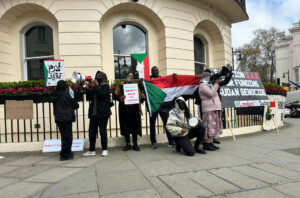Sudan summons EU representative over ‘false information’
The Sudanese Ministry of Foreign Affairs summoned the representative of the European Union to Khartoum concerning a recent statement by the Union. In an announcement that it will provide extra humanitarian aid to Sudan, the European Commission reported that the humanitarian situation in the country is getting worse each day, especially in Darfur, Blue Nile, and South Kordofan states.
Ali El Sadig, the Director of the Peace and Humanitarian Affairs Department at the Ministry, told the official Sudan news agency (Suna) on Tuesday that he conveyed Sudan’s strong rejection to the “deceptive and erroneous information” in the Commission’s statement.
El Sadig stressed the stability of the humanitarian and security situation in the three mentioned states, and pointed to efforts Sudan undertakes in cooperation with the World Food Programme and the South Sudanese government for receiving and helping refugees.
The ministry official criticised the statement (https://www.dabangasudan.org/en/relief-news/article/eu-boosts-humanitarian-aid-for-sudan-by-4-million) for mentioning the serious restrictions to humanitarian access, and that safer working conditions need to be assured for relief workers. The rebel SPLM-N in Blue Nile and South Kordofan block the delivery of humanitarian aid, El Sadig said, but the EU did not refer to that in its statement.
The number of entry visas and permits issues by the Ministry to employees of humanitarian and development organisations has reached 500 in the first half of 2015, El Sadig concluded.
He did not name the representative of the EU, but the Union’s website lists Tomas Ulicny as the ambassador there.
EU Commissioner for Humanitarian Aid and Crisis Management, Christos Stylianides, said on 17 July that the increasing number of refugees from South Sudan makes the already fragile context of Sudan even more difficult.
Blue Nile displacement
Earlier, in May, the UN Resident and Humanitarian Coordinator in Sudan ad interim, Geert Cappelaere, expressed his concerns about reported large-scale displacement, including possible forced relocations, in Blue Nile state.
The Sudanese humanitarian organisation Faida reported in a press statement on 25 June that Sudanese army forces forcibly relocated people living in the Bau locality’s Ingessana Mountains. The UN Office for the Coordination of Humanitarian Affairs in Sudan confirmed that an estimated 24,500 people had fled Bau by 2 July.
The Sudanese Ministry of Foreign Affairs summoned the representative of the European Union to Khartoum concerning a recent statement by the Union. In an announcement that it will provide extra humanitarian aid to Sudan, the European Commission reported that the humanitarian situation in the country is getting worse each day, especially in Darfur, Blue Nile, and South Kordofan states.
Ali El Sadig, the Director of the Peace and Humanitarian Affairs Department at the Ministry, told the official Sudan news agency (Suna) on Tuesday that he conveyed Sudan’s strong rejection to the “deceptive and erroneous information” in the Commission’s statement.
El Sadig stressed the stability of the humanitarian and security situation in the three mentioned states, and pointed to efforts Sudan undertakes in cooperation with the World Food Programme and the South Sudanese government for receiving and helping refugees.
The ministry official criticised the statement for mentioning the serious restrictions to humanitarian access, and that safer working conditions need to be assured for relief workers. The rebel SPLM-N in Blue Nile and South Kordofan block the delivery of humanitarian aid, El Sadig said, but the EU did not refer to that in its statement.
The number of entry visas and permits issues by the Ministry to employees of humanitarian and development organisations has reached 500 in the first half of 2015, El Sadig concluded.
He did not name the representative of the EU, but the Union's website lists Tomas Ulicny as the ambassador in Khartoum.
EU Commissioner for Humanitarian Aid and Crisis Management, Christos Stylianides, said on 17 July that the increasing number of refugees from South Sudan makes the already fragile context of Sudan even more difficult.
Blue Nile displacement
Earlier, in May, the UN Resident and Humanitarian Coordinator in Sudan ad interim, Geert Cappelaere, expressed his concerns about reported large-scale displacement, including possible forced relocations, in Blue Nile state.
The Sudanese humanitarian organisation Faida reported in a press statement on 25 June that Sudanese army forces forcibly relocated people living in the Bau locality’s Ingessana Mountains. The UN Office for the Coordination of Humanitarian Affairs in Sudan confirmed that an estimated 24,500 people had fled Bau by 2 July.











 and then
and then